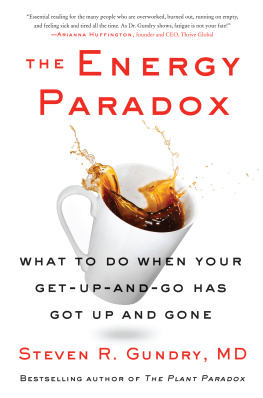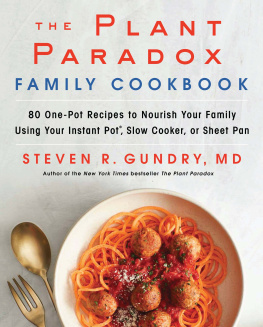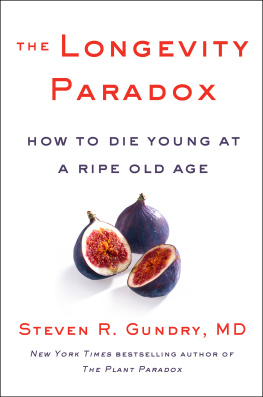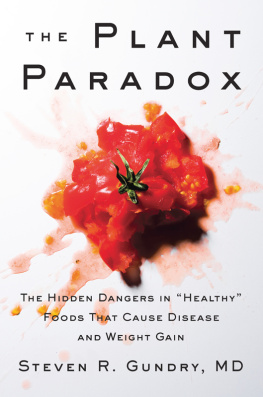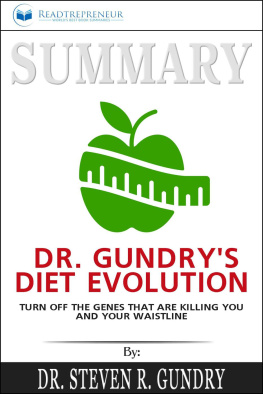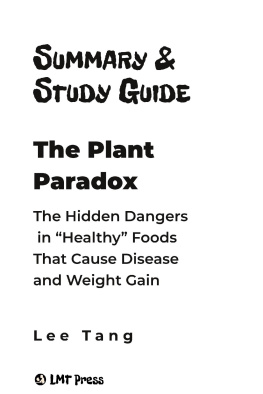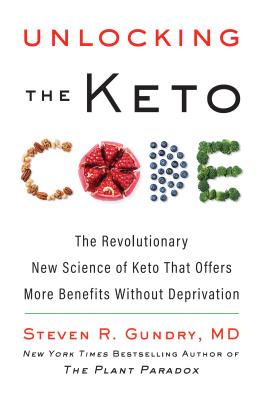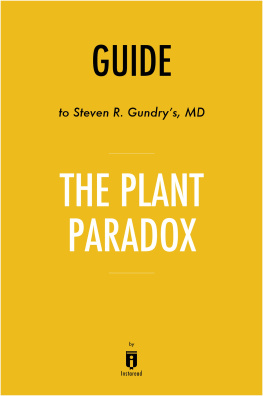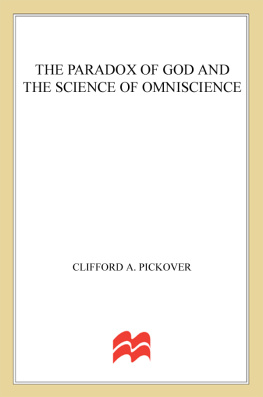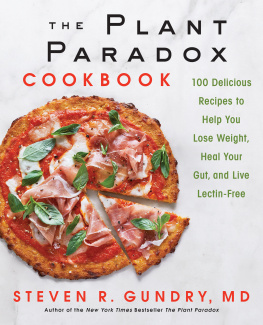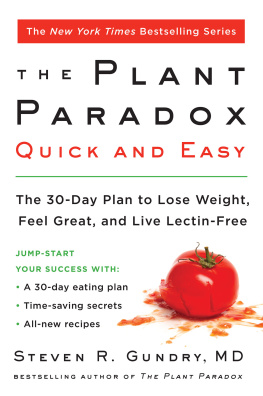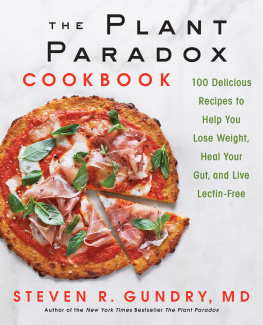Steven R. Gundry - Energy Paradox : What to Do When Your Get-up-and-go Has Got Up and Gone
Here you can read online Steven R. Gundry - Energy Paradox : What to Do When Your Get-up-and-go Has Got Up and Gone full text of the book (entire story) in english for free. Download pdf and epub, get meaning, cover and reviews about this ebook. year: 2021, publisher: HarperCollins, genre: Romance novel. Description of the work, (preface) as well as reviews are available. Best literature library LitArk.com created for fans of good reading and offers a wide selection of genres:
Romance novel
Science fiction
Adventure
Detective
Science
History
Home and family
Prose
Art
Politics
Computer
Non-fiction
Religion
Business
Children
Humor
Choose a favorite category and find really read worthwhile books. Enjoy immersion in the world of imagination, feel the emotions of the characters or learn something new for yourself, make an fascinating discovery.
- Book:Energy Paradox : What to Do When Your Get-up-and-go Has Got Up and Gone
- Author:
- Publisher:HarperCollins
- Genre:
- Year:2021
- Rating:3 / 5
- Favourites:Add to favourites
- Your mark:
- 60
- 1
- 2
- 3
- 4
- 5
Energy Paradox : What to Do When Your Get-up-and-go Has Got Up and Gone: summary, description and annotation
We offer to read an annotation, description, summary or preface (depends on what the author of the book "Energy Paradox : What to Do When Your Get-up-and-go Has Got Up and Gone" wrote himself). If you haven't found the necessary information about the book — write in the comments, we will try to find it.
Energy Paradox : What to Do When Your Get-up-and-go Has Got Up and Gone — read online for free the complete book (whole text) full work
Below is the text of the book, divided by pages. System saving the place of the last page read, allows you to conveniently read the book "Energy Paradox : What to Do When Your Get-up-and-go Has Got Up and Gone" online for free, without having to search again every time where you left off. Put a bookmark, and you can go to the page where you finished reading at any time.
Font size:
Interval:
Bookmark:
Dr. Gundrys Diet Evolution
The Plant Paradox
The Plant Paradox Cookbook
The Plant Paradox Quick and Easy
The Longevity Paradox
The Plant Paradox Family Cookbook

This book contains advice and information relating to healthcare. It should be used to supplement rather than replace the advice of your doctor or another trained health professional. If you know or suspect you have a health problem, it is recommended that you seek your physicians advice before embarking on any medical program or treatment. All efforts have been made to assure the accuracy of the information contained in this book as of the date of publication. This publisher and the author disclaim liability for any medical outcomes that may occur as a result of applying the methods suggested in this book.
THE ENERGY PARADOX . Copyright 2021 by Steven R. Gundry, MD. All rights reserved under International and Pan-American Copyright Conventions. By payment of the required fees, you have been granted the nonexclusive, nontransferable right to access and read the text of this e-book on-screen. No part of this text may be reproduced, transmitted, downloaded, decompiled, reverse-engineered, or stored in or introduced into any information storage and retrieval system, in any form or by any means, whether electronic or mechanical, now known or hereafter invented, without the express written permission of HarperCollins e-books.
Cover design by Milan Bozic
Cover photograph Alter-ego/Shutterstock
FIRST EDITION
Digital Edition MARCH 2021 ISBN: 978-0-06-300574-7
Version 02062021
Print ISBN: 978-0-06-300573-0
To Essential Workers everywhere.
Lets get you some more energy, now!
Chapter 1
How Did We Get Here?
Chapter 2
Body on Fire: How Inflammation Steals Your Energy
Chapter 3
Damaged Roots, Degraded Soil, and the Postbiotic Conundrum
Chapter 4
Your Mighty Mitochondria Are All Mixed Up
Chapter 5
Inflamed and Energy Starved: The Tired Modern Brain
Chapter 6
Its All About Timing (and Good Choices)
Chapter 7
The Energy Paradox Eating Program
Chapter 8
The Energy Paradox Lifestyle
Chapter 9
Energy Paradox Recipes
Chapter 10
The Energy Paradox Supplement List
I Just Dont Have It in Me
Confession: I had absolutely no intention to write this book. The idea of writing about energy didnt fit into my plans. But then I received a phone call last year that I just couldnt stop thinking about, and everything changed.
I had been driving to a television studio in Orange County, California, where I was scheduled to do one of my favorite extracurricular activities: appear on a fundraising segment for public television. As I got close to my destination, a phone call came in over the cars speakers. The producer told me that Kathy, a PBS presenter who was supposed to interview me on-air, wouldnt be able to make it in. Did something serious come up? I inquired, concerned for her and a little curious how wed pull off the segment. The producer replied, Shes really sorry; she said shes been feeling like her energy has evaporated lately and today it hit her like a Mack Truck. Shed like to rescheduleshe just doesnt have it in her to work today.
That simple phrase reverberated in my mind for a good few days. She just doesnt have it in her. As a restorative medicine physician, Im accustomed to the majority of my patients reporting fatigue as one symptom among manytypically mentioned in a weary aside after a list of more pressing complaints. These days, about 70 percent of the patients in my Centers for Restorative Medicine in Santa Barbara and Palm Springs, California, come for treatment of autoimmune conditions that have befuddled a series of doctors and specialists. I am never surprised that these folksthe patients I will always be grateful to for inspiring my first Paradox book, The Plant Paradoxfeel like theyre running on empty. After all, autoimmune conditions are by their very nature fatiguing, because rampant inflammationwhich is both a cause and a consequence of autoimmunityis exhausting! Ive helped so many of these patients restore their health from the ground up, and in the process reclaim their lost energy, that Im afraid I quite took it for granted that fixing the underlying causes of disease was part and parcel of fixing energy levels. Regaining energy was a natural by-product of fixing what ails you. Energy comes back. That inner pep returns. Call me an optimist, but I had always put more focus on the bounce back than I had on that inevitable low starting point.
But that phone call about Kathy helped to clarify something that suddenly felt bracingly relevant. Ive been an energy doctor for decades! I just hadnt seen it that way, because that had been eclipsed by the more headline-grabbing stuffthe big-ticket items of cardiology, cardiothoracic surgery, and autoimmunity as well as aging and longevitythat take up more airtime in our current health conversation. The thing is, all of these health issues are intimately connected. Your baseline of energy, your resilience against diseases, your ability to live long and prosperyou cannot separate any of them from the other. And as the COVID-19 pandemic has proved, we cant take our resilience for granted any longer.
So while she doesnt know it, Kathy inspired me to start thinking more about energy and how we lose it. As I investigated the strange levels of fatigue plaguing people of all ages, it became clear to me that almost everyone experiences this unfortunate scenario to some degree today. Im not talking about the sleep deprivation that comes after a night of caring for a newborn, or the wooziness that accompanies traveling across time zones, or the physical depletion that comes after a grueling workout; these are all situation-specific outcomes of unusual circumstances. Im also not talking about the overwhelming fatigue suffered by my patients challenged with chronic fatigue syndrome, POTS (postural orthostatic tachycardia syndrome), or cancerthough for many, exhaustion is indeed a sign of underlying illness. The kind of tiredness Im concerned with is the persistent experience of being drained of your usual energy, capacity, and sometimes clarity, within the context of your normal life. This is the hard-to-shake everyday tiredness that so many of us are familiar with but tend not to nameoften sweeping it under the rug. It is a generalized inertia experienced by what I might call the unsick, or as some in functional medicine call it, the walking well. That term refers to those who consider themselves free of maladiesnothings driving them to the doctorbut may nonetheless feel less than their best. Today, the walking well have become proficient at shouldering a pretty heavy pack of fatigue. And its taking a toll on multiple frontsfrom their personal contentment and fulfilment, to their ability to show up fully in relationships, to their ability to work, and to, Im sorry to say, important aspects of their long-term health.
I started noticing this energy problem in patients who were seeing me for general maintenancekeeping their vehicle in good working order, so to speak. They represented this new, slow-moving groundswell. These men and women dont have many diagnosed conditions per se, happily for them. Theyre doing okay by most assessments. Yet its undeniable. An ever-increasing number of them admit, when I ask, that they are flagging and weary. Its not only the ones you might expect, like parents of young children, or busy entrepreneurs, or essential workers. Feeling exhausted is prevalent more or less across the board.
Font size:
Interval:
Bookmark:
Similar books «Energy Paradox : What to Do When Your Get-up-and-go Has Got Up and Gone»
Look at similar books to Energy Paradox : What to Do When Your Get-up-and-go Has Got Up and Gone. We have selected literature similar in name and meaning in the hope of providing readers with more options to find new, interesting, not yet read works.
Discussion, reviews of the book Energy Paradox : What to Do When Your Get-up-and-go Has Got Up and Gone and just readers' own opinions. Leave your comments, write what you think about the work, its meaning or the main characters. Specify what exactly you liked and what you didn't like, and why you think so.

